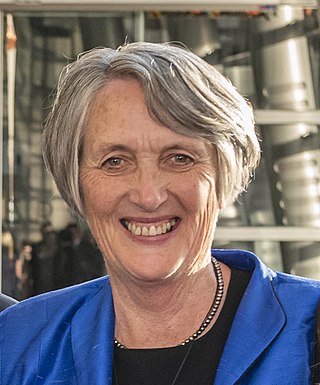Top Qs
Timeline
Chat
Perspective
Kate Dewes
New Zealand peace activist From Wikipedia, the free encyclopedia
Remove ads
Catherine Frances Dewes ONZM (born 1953) is a New Zealand activist for disarmament and former advisor on peace matters to two United Nations Secretaries-General.[1][2] She was appointed an Officer of the New Zealand Order of Merit in the 2001 New Year Honours, for services to the peace movement.[3]
Remove ads
Education and early career
Summarize
Perspective
Dewes grew up in a "conservative family" as one of eight siblings.[4] Her father was a veterinary surgeon.
She was head prefect at Hamilton Girls' High School.[5] After leaving school, she studied music at the University of Canterbury and became a music teacher at Epsom Girls' Grammar. Part of the school music curriculum was a song of lament about Hiroshima and Nagasaki atomic bombings.[6] Playing that song to her pupils inspired her to become involved in the peace movement.[7] She joined a non-violent waterborne protest group called the Peace Squadron, aimed at preventing armed US warships from visiting Auckland Harbour.[1][4][6]
During the late 1970s, she and a growing number of New Zealanders rallied against the United States Government's policy of “neither confirming nor denying” the presence of nuclear warheads on their warships.[8] By 1983 public opinion had swung 72% in favour of banning warship visits.[9]
Not long after, Dewes enrolled in a peace studies program at the University of Bradford, whilst juggling motherhood with a teaching career and a number of official positions and voluntary roles.[4]
She is married to Robert Green, a former British Royal Navy commander, who partners with her in advocating for peace, disarmament and against nuclear proliferation.[10]
The senior journalist, Mike Crean, in an interview with Dewes after her New Year Honour,[4] explored that idea that the strength of her feelings came from her ancestors; for she had only recently found out that not only did her paternal great-grandmother work for peace among the northern Hawkes Bay Māori in 1870, but also her maternal grandparents had campaigned for temperance and women's suffrage in the late 19th century.[4]
Remove ads
Campaigns and professional achievements
Summarize
Perspective
Dewes successfully lobbied for the world's first national nuclear-free laws, known as the New Zealand Nuclear Free Zone, Disarmament, and Arms Control Act 1987.[1][11] In 1988, she was part of a New Zealand Government delegation to the United Nations Special Session on Disarmament III, and while in New York, marched to promote New Zealand's nuclear-free zone and Nuclear Free New Zealand / Aotearoa.[12]
She played a key role in the World Court Project that led to the 1996 historic judgement by the International Court of Justice, in The Hague, which unanimously ruled that a threat to use and the use of nuclear weapons is generally illegal according to international law.[1][4][13] She subsequently completed her doctorate at the University of New England in Australia, with a thesis entitled The World Court Project: The Evolution and Impact of an Effective Citizens' Movement.[14][15]
Along with her husband, she is co-founder and co-director of the Disarmament & Security Centre (DSC), which they established at their home in Riccarton. She was also a director of the South Island Regional Office of the Aotearoa / New Zealand Peace Foundation[16] and became Vice President of the International Peace Bureau in 1997.[6][15] As a member of the Government's Pacific Advisory Committee, she championed issues important to small Pacific Island states, including the knock-on effects of past nuclear detonations at Moruroa and Fangataufu atolls.[11] She lectured in Peace Studies at the University of Canterbury from 1986 to 1997, where she is an Adjunct Senior Fellow at the College of Arts.[11][15]
From 2008 to 2012, Dewes was a member of the United Nations Secretary-General's advisory board on Disarmament Matters.[17] She and her husband were negotiators on the first legally-binding international treaty to comprehensively prohibit nuclear weapons.[2]
In 2019, Dewes donated the archives of the Disarmament & Security Centre to the Macmillan Brown Library at the University of Canterbury.[18] In the same year she and her husband were mentioned as potential Nobel Peace Prize contenders.[19][20]
Remove ads
References
External links
Wikiwand - on
Seamless Wikipedia browsing. On steroids.
Remove ads

